More than 1 in 10 millennials have fallen victim to ticket counterfeiting, according to a study by anti-counterfeiting outfit Aventus. You probably know someone who’s been scammed by a fake event pass, even if they’re hesitant to admit it.
The good news is the world is full of legitimate places to buy genuine sports tickets for contests in the NFL, NBA, MLB, NHL, and other top-tier professional leagues, often at a substantial discount to face value. Keep reading for the top digital options — and a couple of physical ones — offering the optimal balance between reasonable price, ample supply, and quality seating.
Places to Buy Cheap Discount Sports Tickets
Each of these sources has its own set of advantages and drawbacks. Some are also reputed to be legitimate sources of nonsports tickets, such as concerts and festivals, theatrical performances, and conventions.
Use this list as a guide to find tickets that suit your needs, keeping in mind that the lowest possible price doesn’t always signify the best deal.
1. The Box Office

The box office is the most obvious, lowest-suspense source for genuine sports tickets. You’ll pay face value every time, and when the game is sold out, it’s sold out, but you’re guaranteed to get a real ticket for a real seat at a real time.
These days, you don’t have to show up at the ballpark to get tickets at the “box office.” You can visit the official website for the home team, league, or venue, and select your preferred game, section, and seats. If you work close to the venue, though, consider buying in person — you’ll save on fees that way.
Pros of the Box Office
Buying at the box office has several advantages beyond the authenticity guarantee. It’s good if you have a larger group, want to avoid ticky-tack fees, or failed to plan ahead (hey, it happens).
- Guaranteed genuine tickets. Tickets purchased from an official team or league source are guaranteed to be genuine, period.
- Good for larger groups, package deals, and season tickets. The box office is more likely than any other source to have contiguous blocks of seats available for larger groups — say, 10 or more people. It’s also easier to find multigame packages and season tickets here, both of which offer deep discounts to single-ticket face value.
- In-person sales may have lower fees. If it’s not too inconvenient for you to get to the box office, you may save on otherwise unavoidable transaction fees. You may also avoid the sorts of excessive fees tacked on by third-party ticket-sellers (ahem, Ticketmaster).
- Good for last-minute purchases. The actual box office is the best place to find genuine tickets at the last possible moment as you’re walking into the venue. Sanctioned mobile apps work for this purpose as well.
Cons of the Box Office
Buying from the box office has some downsides. The biggest are the fact that you always pay face value and you can’t buy tickets to sold-out games.
- No discounts to face value. Absent special promotions, the box office never marks down tickets. That said, the laws of supply and demand apply here — for instance, tickets for any remaining regular-season games are significantly cheaper when the team is mathematically eliminated from the playoffs.
- No resale. The box office doesn’t resell tickets, nor does it sanction third-party resales. Once the game is sold out at the box office, you’ll need to find another source.
2. Ticketmaster
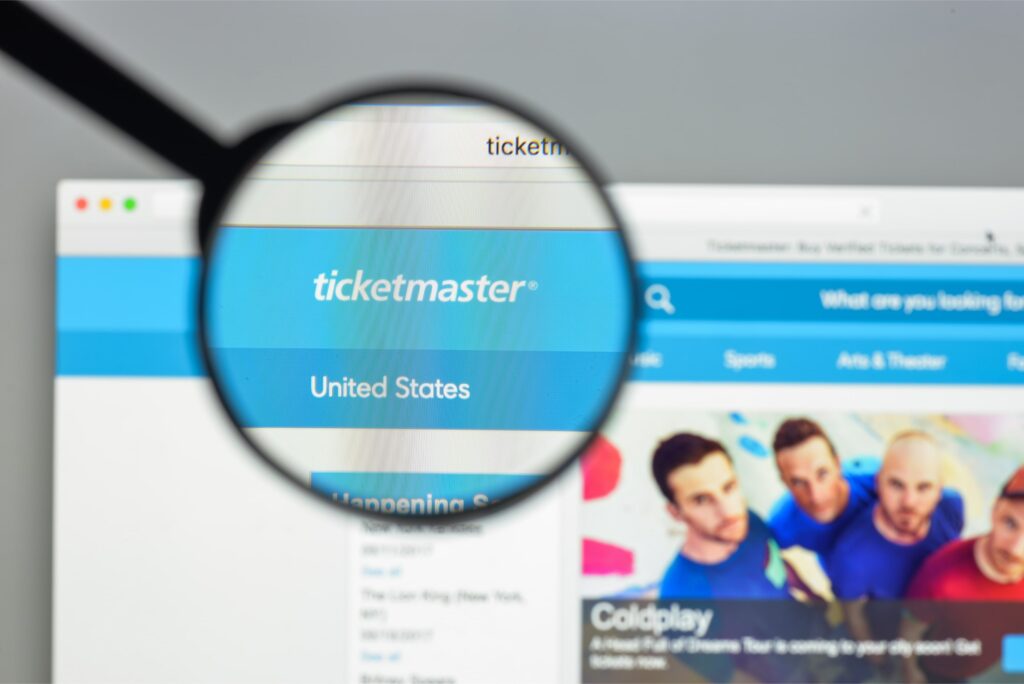
Ticketmaster is one of the Internet’s most credible sports ticket marketplaces. Here, you’ll find full-price original tickets at Ticketmaster’s virtual box office, variably priced tickets sold through authorized resellers such as NBAtickets.com, and tickets sold by private holders, also known as Fan-to-Fan Resale. All tickets sold through Ticketmaster are verified to be genuine, so there’s virtually no risk of scams. But Ticketmaster has been known to jack up ticket prices and tack on unreasonable fees.
Pros of Ticketmaster
Ticketmaster is credible, comprehensive, allows resale between fans, and has a decent return policy. It’s a reliable platform all around.
- High credibility. Ticketmaster has been in business for more than 40 years. It’s a known quantity for buyers and sellers alike, and it’s deadly serious about fraud. While Ticketmaster is not the cheapest place to find first-sale and resale sports tickets, its credibility may be worth whatever premium you pay.
- Ample supply for available teams and events. Ticketmaster’s ticket supply is vast. Smaller discounters’ selection is likely to be more scattershot, particularly for popular contests.
- Direct sales option. The Fan-to-Fan Resale option is your most reliable source for deeply discounted sports tickets at Ticketmaster. Since all tickets are verified, it’s safer than buying directly from unvetted sellers.
- Solid return policy. “All sales are final” is a common refrain in the world of online ticket sales, but not on Ticketmaster. Depending on the game, you may have up to three days to return your ticket for a full refund.
Cons of Ticketmaster
Ticketmaster isn’t the best choice for every sporting event, and it is often more expensive than buying from the box office.
- Significant team and event omissions. Ticketmaster isn’t authorized to sell tickets for all major sporting events. In my experience, the box office is a better bet for collegiate athletics tickets.
- Resale prices are often higher for popular contests. Ticketmaster is a free market. Ticket prices for in-demand contests, especially playoff games, are likely to appreciate as game day approaches. Last-minute buyers might have better luck with scalpers or Craigslist sellers desperate to unload their inventory.
- Limited fan-to-fan resale coverage. Ticketmaster is clear about the limitations of its Fan-to-Fan Resale feature. Many matchups aren’t included. General-purpose platforms like eBay and Craigslist may have a better selection.
3. Craigslist
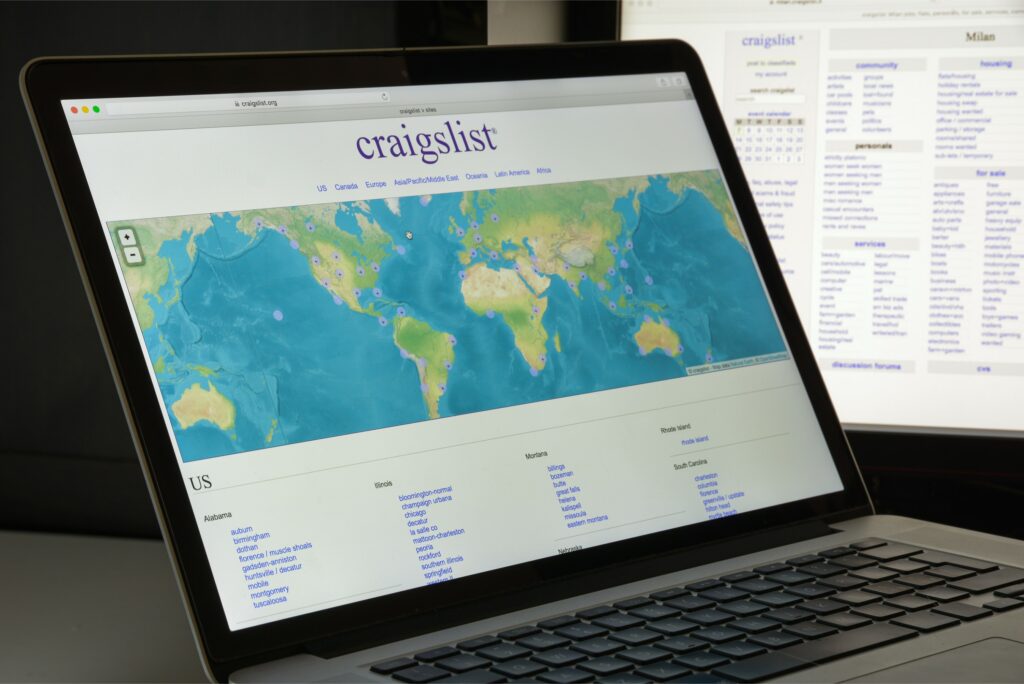
Craigslist is the original online classified marketplace, known for its endless variety of goods and services for sale. In major metropolitan markets, Craigslist has tickets for virtually any professional and collegiate sporting event right up to game day. If you can’t find what you’re looking for, set an email alert, and you’ll probably learn about it soon enough.
Craigslist does have a significant drawback: fraud. Craigslist’s peer-to-peer structure and nonexistent vetting protocols make the platform ripe for fraud and abuse. Buyers are responsible for verifying that tickets they purchase through Craigslist are genuine. Chicago Tribune writer Megan McDonough recommends dealing with sellers in person, examining tickets closely for inconsistencies before completing the transaction, and requesting copies of the seller’s ticket receipt and state ID.
Pros of Craigslist
Craigslist remains a robust marketplace for sports tickets. It’s cheaper than many other options as well, or at least has the potential to be.
- Endless variety. Craigslist is renowned for its wide variety of offerings. You’re more likely to find tickets for your preferred game and section here than on any other single resale marketplace.
- Potential for deep discounts. Craigslist is rife with desperate sellers willing to offload their tickets at almost any price. I’ve been on the seller side of such transactions and can attest to this.
Cons of Craigslist
You’re probably aware that Craigslist is a hotbed of fraud, but that’s not the only drawback to the platform.
- In-person transactions are best. Conducting transactions in person mitigates outright theft or fraud, but it’s not always convenient, especially at the last minute if the seller isn’t willing to meet near the venue.
- Seat selection may be limited. Despite ample ticket supply, Craigslist isn’t great for buyers seeking specific seats. At any given time, what you see is what you get, although you can always post an ad requesting tickets in your preferred section.
- Tickets go fast. Although high buyer demand stimulates supply, tickets for popular games with a supply-demand imbalance tend to go quickly.
- Fraud remains a serious problem. Craigslist has made strides in its fight against fraud, but it’s unlikely to stamp out the problem entirely anytime soon, and its reputation has suffered as a result. If guaranteed genuine tickets are more important to you than the best possible price, look elsewhere.
4. eBay
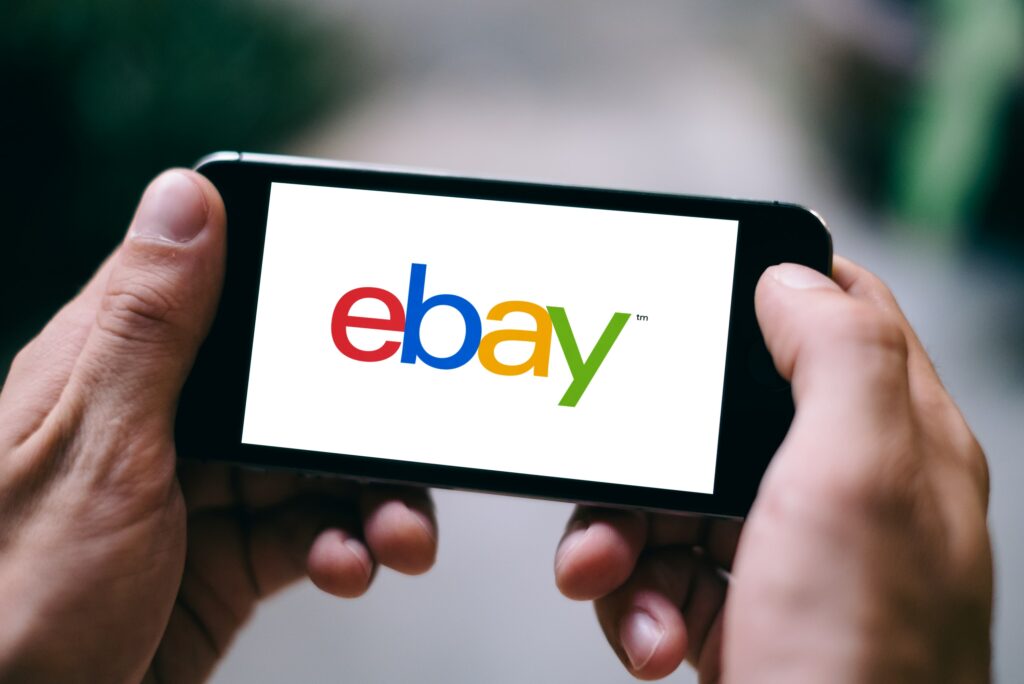
Like Craigslist, eBay boasts incredible variety. If it’s tangible and legal, you can probably buy it there. And though it started as an auction marketplace, eBay today has plenty of fixed-price sales. So chances are good that you won’t have to bid on sports tickets, although auction sales may well be your best bet at scoring deeply discounted tickets for less popular events.
Although fraud is more common on eBay than on authorized third-party resellers and brokers like Ticketmaster, eBay has some safeguards that Craigslist lacks, including a money-back guarantee that provides some dispute resolution support on covered items. Still, you should take commonsense steps to protect yourself, including asking for the seller’s receipt, and read the fine print before you buy.
Pros of eBay
eBay’s advantages include a huge selection of sporting events tickets and the potential (though not the guarantee) to get deep discounts at auction.
- Vast selection. Like Craigslist, eBay has an ample, varied supply of sporting event tickets.
- Great discount opportunities at auctions. Although less common than in the early days of eBay, auctions remain integral to any comprehensive discount-hunting strategy. On a cursory search of eBay’s sports ticket auctions, I found last-minute listings with bids starting as low as $1 per ticket, usually posted by season ticket holders who can’t make the game.
Cons of eBay
eBay has some of the same drawbacks as Craigslist, though it’s a bit better in the fraud department due to its still-modest consumer protections.
- Potential for fraud. Although eBay is slightly better than Craigslist on this count, fraud still does happen here. If you don’t want to deal with the hassle of invoking eBay’s money-back guarantee policy, look to a more reliable platform.
- Seat selection may be limited. You’re not guaranteed to find the exact seats or sections you’re seeking here.
- May need to accept paper tickets. Since eBay sellers are often individuals, there’s no guarantee they’ll offer electronic tickets. If you dislike dealing with paper tickets, your choices may be constrained, or you may want to look to another platform altogether. Paper tickets are particularly impractical for last-minute buyers, for whom shipping by mail isn’t feasible.
5. StubHub
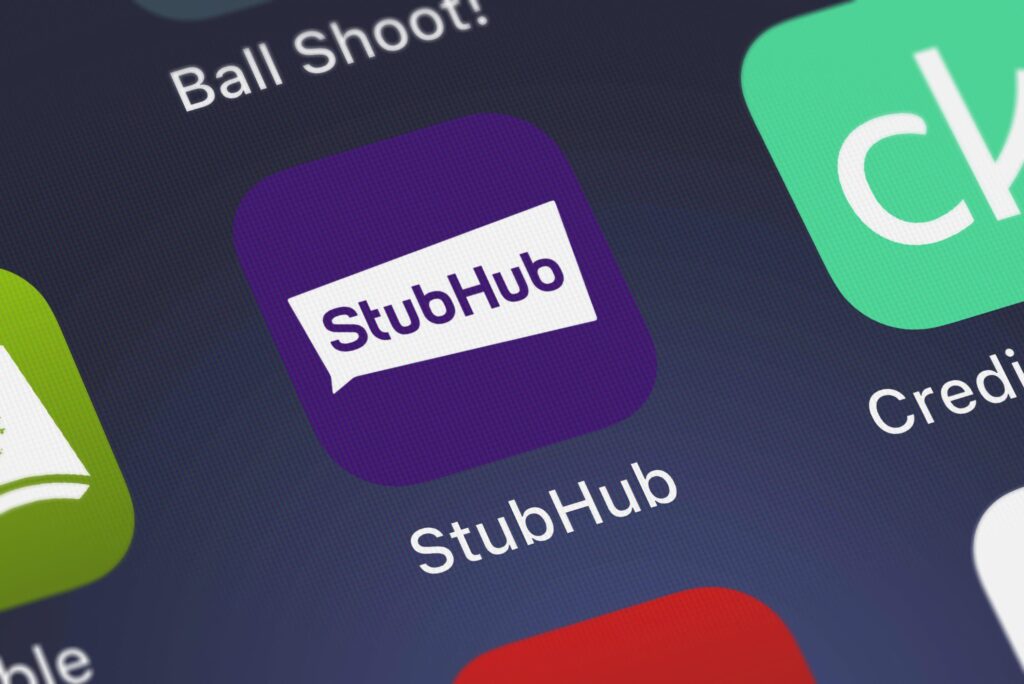
StubHub is the most credible, reliable secondary marketplace for sports tickets — the next best thing to the actual box office, and often cheaper. As the secondary market of choice for most major (and many minor) professional sports leagues, StubHub’s resale variety and quality are without equal. If a game is sold out, or you think you can do better than face value at the venue, start here.
Pros of StubHub
StubHub is a reliable, user-friendly, and legitimate secondary marketplace for sporting event tickets. It certainly feels a lot more modern than Craigslist.
- Seamless delivery. StubHub has a streamlined ticket delivery system that ensures buyers have tickets in hand by game day — no third-party funny business.
- High credibility. StubHub’s credibility is equivalent to Ticketmaster’s. Tickets are guaranteed genuine, so there’s no suspense.
- User-friendly tools and features. StubHub has a slew of features and tools that make the process of finding and buying discounted sports tickets easier and more transparent. My personal favorite is the value meter that rates each transaction by its perceived value — in other words, how seat quality compares to price. The sophisticated price alert tool is nice too.
- Great pro sports selection. As the de facto secondary ticket marketplace for major league sports, StubHub has a fantastic selection.
Cons of StubHub
StubHub can be more expensive than other methods and is better for pro sports selection than collegiate.
- Significant fees. Credibility comes at a price. StubHub’s transaction fees are notable, and not in a good way. Expect to pay more than 20% of your ticket’s sale price in fees — higher than many competitors and infinitely more than unregulated marketplaces like Craigslist.
- Discounts aren’t guaranteed. The laws of supply and demand apply here. You may struggle to find sought-after tickets for less than face value.
- Limited collegiate selection. StubHub has a fantastic selection of pro sports tickets, but it’s not always the best choice for college sports fans.
6. Vivid Seats
Vivid Seats is another popular resale marketplace that looks and feels a lot like StubHub. Sellers tend to be professional or institutional ticket holders with multiple tickets to offload. Accordingly, multiseat packages are relatively common on Vivid Seats.
Availability is fantastic, particularly for collegiate matchups that fall through the cracks at StubHub, and pricing is lower than most competitors’. An expensive fee structure is a principal drawback.
Pros of Vivid Seats
Vivid Seats and StubHub share a lot of the same advantages, including user-friendliness and the potential for significant discounts.
- User-friendly interface. Vivid Seats is easy to use on large- and small-screened devices. The browsing and selection interfaces are even more intuitive than StubHub’s.
- Seamless delivery. Tickets are generally delivered by email as soon as the seller confirms availability and the buyer sends payment, eliminating any suspense from the proceedings. For paper tickets, delivery is guaranteed by game time.
- Useful features and tools. Like StubHub, Vivid Seats has a handy value tool that lets you know whether you’re getting a good deal.
- Potential for significant discounts. In my experience, Vivid Seats is a few bucks cheaper than other popular resale marketplaces. However, sellers are free to set their own prices, so your mileage may vary, and Vivid Seats does have higher-than-average fees (see below).
- Fantastic availability. Vivid Seats’ seat and section availability — which is often better than StubHub’s — is all the more impressive given that it’s not the best-known ticket resale marketplace.
- Good collegiate sports coverage. Compared with StubHub in particular, Vivid Seats has an impressive selection of collegiate sports tickets.
Cons of Vivid Seats
Vivid Seats can have high fees and doesn’t guarantee discounts. But few platforms do.
- High fees. Vivid Seats’ biggest drawback is its high fees — higher than most competing resale marketplaces, including StubHub. Even if you find a lower advertised price here, don’t buy before comparing the final price to other vendors’.
- Discounts aren’t guaranteed. Like other marketplaces, Vivid Seats is vulnerable to the laws of supply and demand.
7. SeatGeek
SeatGeek claims to be the Web’s largest ticket search engine. Like travel aggregators such as Kayak, it’s a meta-engine that searches other ticket resale sites — “hundreds” of them, according to SeatGeek — to find the broadest possible selection.
That’s how it works in theory, anyway. With an intuitive interface and easy-to-use search feature, SeatGeek is worth keeping an eye on, but I’m not sure it’s the best place bar none to find the broadest possible variety of deeply discounted sports tickets. Prices and fees are a bit higher than at StubHub, the sports resale benchmark, and I’ve noticed concerning gaps in availability relative to both StubHub and Vivid Seats.
In any case, SeatGeek’s formal partnership with Major League Soccer (MLS) is a genuine bright spot. I also recommend using SeatGeek to find tickets to music performances near you. The selection on that side of the site is impressive.
Pros of SeatGeek
SeatGeek is a great resource for pro sports fans, and especially pro soccer fans.
- Wide selection of pro sports tickets. SeatGeek has a broad selection of pro sports tickets. A head-to-head comparison of mid-season Chicago Bulls matchups found coverage and availability comparable to StubHub, for instance.
- High ease of use. SeatGeek is straightforward to use. In my opinion, it’s the most mobile-friendly of the major resale marketplaces.
- MLS partnership guarantees stable supply of soccer tickets. SeatGeek is probably the best resale marketplace for MLS tickets. Pro soccer fans, take note.
Cons of SeatGeek
SeatGeek isn’t ideal for collegiate sports and has some of the same drawbacks as StubHub and Vivid Seats otherwise.
- Some availability gaps. Despite its claims to omniscience, SeatGeek has some frustrating availability gaps. In particular, it had nothing available for several of the collegiate games for which I found ample ticket supply on StubHub and Vivid Seats.
- High fees. In my experience, SeatGeek’s fees are even higher than StubHub’s and Vivid Seats’. Perhaps that’s the price one pays for such a broad selection, but it’s concerning in light of SeatGeek’s availability gaps.
- Discounts aren’t guaranteed. You’re not guaranteed to find discounts to face value here, especially when supply is limited, demand is high, or both.
8. Coast to Coast Tickets
Like SeatGeek, Coast to Coast Tickets is a secondary market aggregator that connects third-party sellers with individual buyers. In my experience, its availability and pricing seem comparable to StubHub’s.
Coast to Coast has above-average customer service — you can get a knowledgeable live person on the phone with little trouble. They also have an expansive satisfaction guarantee similar to eBay’s money-back guarantee, but with the additional protection of guaranteed-genuine tickets. These perks make their high service and processing fees easier to swallow.
Pros of Coast to Coast Tickets
Coast to Coast Tickets is a kinder, gentler ticket marketplace with excellent customer service and a satisfaction guarantee that goes above and beyond competing marketplaces.
- Great selection. Coast to Coast Tickets’ pro and collegiate sports ticket selection is on par with StubHub’s.
- Great customer service. Coast to Coast Tickets has an above-average customer service department capable of walking beginners through the resale process. Lower-cost platforms are far less novice-friendly.
- Seamless delivery. Like other secondary marketplaces specializing in verified tickets, Coast to Coast has a seamless digital or paper transfer process that’s guaranteed to get tickets in your hands by game day.
- Satisfaction guarantee. Coast to Coast’s unusually generous satisfaction guarantee all but eliminates the possibility of fraud here.
Cons of Coast to Coast Tickets
Coast to Coast Tickets’ biggest downsides involve the potential or actual cost of its tickets.
- High fees. Coast to Coast Tickets’ service and processing fees are higher than most competitors’. If scoring the lowest price is your top priority, look for lower-marked prices to offset Coast to Coast’s take or use another platform.
- Discounts aren’t guaranteed. Like other secondary marketplaces, Coast to Coast is at the mercy of the laws of supply and demand.
Shop at Coast to Coast Tickets
9. ScoreBig
ScoreBig is an established online ticket marketplace where buyers and sellers can connect and exchange tickets for concerts, sporting events, and theatrical performances. As a third-party resale platform with an electronic delivery option for all venues that support it, ScoreBig is designed for last-minute purchases. However, some buyers might balk at ScoreBig’s notable availability gaps and high service fees.
Pros of ScoreBig
ScoreBig is ideal for last-minute purchasers, to whom it may offer above-and-beyond discounts.
- Potential for significant discounts. ScoreBig offers the potential (but not a guarantee) of substantial discounts on tickets for lower-profile matchups, particularly as game day approaches and sellers’ options narrow.
- Built for last-minute purchases. ScoreBig touts itself as the go-to platform for last-minute purchases of verified entertainment tickets — a more reliable, less sketchy alternative to buying from scalpers in person.
Cons of ScoreBig
ScoreBig can be expensive and may not have the selection you expect from better-known marketplaces.
- Significant availability gaps. ScoreBig has some notable availability gaps. Contests for which I found plenty of available tickets on StubHub and Vivid Seats were marked “unavailable” or “not found” here. Your mileage may vary.
- High fees. ScoreBig’s fees are on par with Coast to Coast Tickets’.
- Discounts aren’t guaranteed. The laws of supply and demand remain in force here.
10. TicketNetwork
TicketNetwork operates separate primary and resale marketplaces under its own brand name. TicketNetwork is closer in appearance and functionality to StubHub than ScoreBig. The most significant differences between the two are TicketNetwork’s lower fees and primary marketplace option.
Pros of TicketNetwork
TicketNetwork is reasonably priced without compromising selection or availability. Yet it has above-average customer service and a user-friendly interface.
- Lower processing and service fees. TicketNetwork’s fees are lower than some competitors’.
- Broad selection and availability. Although your mileage may vary, I’ve found that TicketNetwork has an impressive selection of pro and collegiate contests and seats. The gaps I noticed at ScoreBig weren’t present here.
- Solid customer support. TicketNetwork’s customer service department is available from 7am to 1am Eastern — great news for late-night and West Coast buyers.
- User-friendly interface. TicketNetwork’s interface is more user-friendly than ScoreBig’s. Moving through the selection and checkout process was a dream for me on desktop and mobile — and if I can figure it out, most reasonably tech-savvy fans can too.
Cons of TicketNetwork
TicketNetwork has no bidding feature and doesn’t guarantee discounts, which is unfortunate for last-minute bargain-hunters.
- No bidding feature. TicketNetwork lacks a bidding feature, eroding its value for buyers seeking big discounts.
- Discounts aren’t guaranteed. You’re not guaranteed to find discounts to face value at TicketNetwork, especially not on its primary ticket sales marketplace.
11. Ticket Liquidator
Ticket Liquidator is a secondary resale marketplace affiliated with TicketNetwork. Key selling points here are excellent ticket availability and reasonable — although not bottom-scraping — fees. The interface resembles Ticket Network’s, and the 100% money-back guarantee all but eliminates the possibility that you’ll be permanently put out by seller fraud or forgetfulness.
Pros of Ticket Liquidator
Like TicketNetwork, Ticket Liquidator is user-friendly, has good availability, and is often less expensive than better-known alternatives.
- Reasonable fees. Ticket Liquidator’s service and processing fees are lower than many competitors’, including ScoreBig’s.
- Solid availability. Availability is above-average. If you can’t find what you’re looking for at another TicketNetwork property, check here.
- User-friendly interface. Ticket Liquidator is easier to use than ScoreBig. I breezed right through the checkout process.
Cons of Ticket Liquidator
Ticket Liquidator has no bidding feature and doesn’t guarantee discounts, despite being generally affordable in comparison to the competition.
- Discounts aren’t guaranteed. As a resale marketplace, Ticket Liquidator makes no guarantees that buyers will find discounts to face value.
- No bidding feature. Ticket Liquidator has no bidding feature, so it’s not ideal for buyers targeting deep discounts.
12. TicketIQ
TicketIQ is a secondary market aggregator with a signature differentiator: its Low Price Guarantee. TicketIQ promises that tickets marked “Low Price Guarantee” are priced lower than any other identical ticket on the secondary market. If you find they aren’t, the site will pay 200% of the difference between a higher-priced TicketIQ ticket and a lower-priced competitor ticket. Plus, TicketIQ guarantees a 100% refund on tickets for any cancelled event.
Pros of TicketIQ
TicketIQ goes a bit farther than other platforms in ensuring low prices and keeping fees to a minimum. It’s user-friendly and offers a nice incentive for new sign-ups as well.
- Low price guarantee. Fine print notwithstanding, TicketIQ’s Low Price Guarantee is a great feature that’s worth taking into account when deciding where to begin your ticket search.
- User-friendly website. TicketIQ’s website is easy to use on desktops and mobile devices, with intuitive search features and a seamless checkout process.
- Discount on first purchase. TicketIQ offers $10 off your first purchase, although this is subject to change at the platform’s discretion.
- Relatively low fees. Service and processing fees appear fairly low here. Your mileage may vary, however.
Cons of TicketIQ
TicketIQ’s biggest drawback is its restricted availability for some games. This can be a big problem if it affects your preferred matchups.
- Significant availability gaps. Of all the aggregators I examined, TicketIQ had the thinnest selection of pro and collegiate sports tickets. Some teams were missing entirely, as were some scheduled matchups. For instance, I ran a search for mid-season Chicago Bulls games and found tickets for fewer than 25% of the contests on the NBA’s official schedule. The Bulls aren’t my favorite team in the NBA, but if they were, I’d be miffed by the limited selection.
13. Scalpers
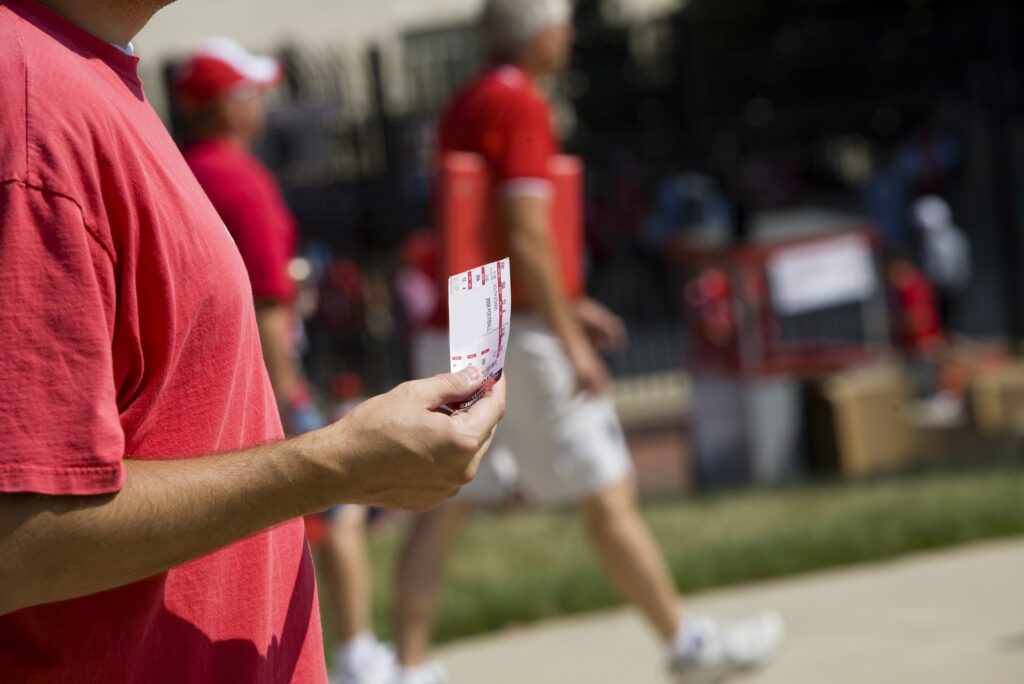
One could argue that any private individual who sells sports tickets without going through an approved third-party intermediary — for instance, directly to buyers on eBay or Craigslist — is a scalper. But the scalpers we’re talking about here are the opportunists hawking tickets outside the venue on game day.
Despite the growing number of alternatives to traditional scalpers, they’re still around. And depending on how you approach them, they may well be your best shot at last-minute access to the big game.
Scalpers hang out around venues up to and through the scheduled start, long after online resellers close up shop. If you don’t mind missing part of the game, the surest way to reduce your out-of-pocket expense is to arrive after the game begins and negotiate a killer deal with a desperate scalper.
Pros of Scalpers
Scalpers are convenient and easy to find. That could be all the encouragement you need to use them as game time approaches.
- Available at the last minute. If you need sports tickets at the very last minute, you’ll find them outside the venue. Some scalpers hawk their inventory up to and through game time.
- Potential for deep discounts. Some scalpers are regular fans in dire straits — they can’t attend the game because their kid is sick, or they bought tickets for friends who subsequently no-showed — who need to get rid of their tickets now. Play it cool, and you can score incredible deals off these folks.
Cons of Scalpers
Scalpers can be unscrupulous and often drive a hard bargain. That’s because they know they’re the source of last resort for desperate fans.
- High counterfeiting risk. If you must buy from a scalper, take commonsense precautions, such as asking for their original receipt, and carefully examine the ticket before handing over payment. If possible, use the venue’s approved resale area.
- Limited seat choice. Individual scalpers can only hold onto so many tickets at once. Savvy professionals are more likely to buy contiguous blocks of two or more seats, but you’re unlikely to find adjacent seating for larger groups or in your preferred section.
- Professional sellers are tough negotiators. Unless the weather is bad, the game is inconsequential, or you wait until after the game starts, you’re unlikely to get a great deal from a professional scalper. They know you need the ticket more than they need to sell it.
- Sellers may demand cash. Despite the ubiquity of peer-to-peer (P2P) money transfer platforms such as PayPal and mobile wallets, many scalpers remain cash businesses. If you’re not comfortable carrying substantial amounts of cash to the ballpark or arena, you may want to buy your tickets ahead of time.
- Anti-scalping policies may interfere. Pay close attention to venues’ anti-scalping rules. You don’t want to fork over serious cash only to be denied entry or ejected before you can enjoy the game.
Final Word
There’s more art to buying genuine sports tickets on the secondary market than budget-conscious fans may like. Finding the best possible deal on the perfect tickets isn’t just about using the right sales platform with the optimal balance of availability, pricing, and fees. After all, smart sellers list tickets on multiple sites. If you use one of the aggregator sites listed here, you’re likelier than not to encounter any given ticket.
Ultimately, your buying experience — whether you’re satisfied with it and whether it comes in under budget — depends more on the timing of your purchase and the seats you ultimately end up with. As long as you have the option to get your tickets delivered digitally, don’t be afraid to wait to purchase until shortly before game day when nervous sellers will be more willing to cut you a deal on better-than-expected seats.